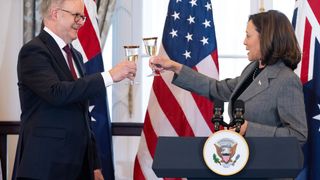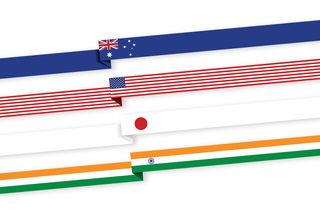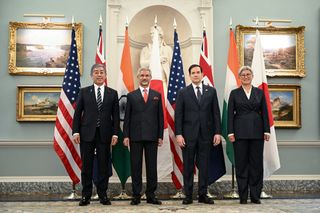After weeks of turmoil, Vice President Kamala Harris is set to assume President Joe Biden’s mantle as the 2024 Democratic presidential nominee. Harris has already made history as the first female, Black and South Asian vice president, but could now go one step further and become the first female US president. Harris was elected vice president with relatively limited foreign policy experience, but in office she has gained on-the-ground experience at a number of summits and meetings on the global stage. While she has primarily focused on domestic policy throughout her career and is unlikely to diverge significantly from Biden on most issues, her positions on trade and the war in Gaza could be notable exceptions. Nevertheless, if she wins in November, Australians can expect more continuity than change in US foreign policy.
Who is Kamala Harris?
Known for: Vice President (2021–), Senator from California (2017–21), Attorney General of California (2011–17), District Attorney of San Francisco (2004–11)
Home state: California
Age in November 2024: 60 (born 20 October 1964)
Harris began her career as a prosecutor in 1990 and rose to become the District Attorney of San Francisco in 2004. Six years later, she was elected as the Attorney General of California, the state's top law enforcement official. Harris entered national politics in 2017, becoming a US Senator for California and attracting national attention for her prosecutorial style in committee hearings. She ran directly against Biden in the 2020 Democratic presidential primaries but suspended her campaign before a single vote was cast after what many described as a mismanaged effort. While Harris touted herself as a "progressive prosecutor," her record came under heavy scrutiny by the Democratic party's left flank, who welcomed her various environmental efforts, previous multi-billion dollar settlement over home foreclosure abuses, and personal opposition to the death penalty, but were critical of her "tough-on-crime" policies. As vice president, Harris has grappled with favourability ratings that until recently were lower than President Biden’s and was initially handed the tough portfolio of dealing with the “root causes” of the immigration crisis. Yet since the 2022 fall of Roe v Wade, Harris has found more success as the administration’s primary messenger on abortion rights.
What should Australians know?
While Harris has not visited Australia, she has spoken fondly of the importance of Australia-US bilateral ties and met with Prime Minister Albanese several times as vice president. In their most recent meeting attached to Prime Minister Albanese’s official state visit in October 2023, the two canvassed their shared values on issues like climate cooperation and gun control. Harris has also praised AUKUS and the Quad partnership and repeatedly lauded the US global network of allies and partners, highlighting the particular importance of the Indo-Pacific to US security. While she could diverge from Biden on issues like trade and the war in Gaza, on the whole, Harris is likely to follow in Biden’s footsteps on the issues that matter most to Australia.
Foreign policy
- US global leadership | Harris has praised US-led post war internationalist institutions, laws and norms as the country’s greatest foreign policy accomplishment, and cautioned against isolationist calls for the US to retreat from the global stage. She has similarly argued that US global leadership is vital to the country’s national security, noting that "when America has isolated herself, threats have only grown." During the 2020 presidential primaries, Harris highlighted the importance of the United States remaining consistent with its commitments to US allies, stating "Part of the strength of who we are as a nation... is not only that we have a vibrant military, but that when we walk in any room around the globe, we are respected because we keep to our word."
- Asian alliances | Harris has repeatedly spoken of the importance of the Indo-Pacific to American security and prosperity, meeting with the heads of all five US Indo-Pacific treaty allies during her tenure as vice president. Harris has praised the AUKUS pact as evidence of US “commitment to a free and open region,” and flagged her support for IPEF — the US-led economic initiative linking Australia with 13 other Indo-Pacific economies — as a key plank of regional supply chain resilience. Harris has particularly devoted time to the administration’s oft-neglected relationships with Southeast Asian partners, stepping in for Biden at regional summits like the East Asiaand US-ASEAN Summits in 2023, and reaffirmed the importance of US ties and international norms, notably regarding Beijing’s revisionist behaviour in the South China Sea.
- China | Vice President Harris met with Chinese President Xi Jinping on the margins of the APEC Leaders Retreat in Bangkok in 2022, where she urged him to “maintain open lines of communication to responsibly manage the competition between our countries.” She has spoken of the need for the United States to not decouple from China but to be “a leader in terms of the rules of the road” on trade. As a Senator, she was highly critical of the Trump administration’s trade war with China, claiming that it hurt American workers and the economy. However, her most vocal comments about China have focused on issues related to human rights. In 2019, she stated that "China's abysmal human rights record must feature prominently in our policy toward the country.” In her 2020 presidential campaign run, Harris said that “under my administration, we will cooperate with China on global issues like climate change, but we won't allow human rights abuses to go unchecked.” She co-sponsored the bipartisan 2020 Uyghur Human Rights Policy Act and the 2019 Hong Kong Human Rights and Democracy Act which impose sanctions against “foreign individuals and entities responsible for human rights abuses” in Xinjiang and officials in Hong Kong, respectively.
- Taiwan | Vice President Harris has stated that the United States “will continue to support Taiwan’s self-defence, consistent with our long-standing policy.” In September 2022, she described peace and stability in the Taiwan Strait as “an essential feature of a free and open Indo-Pacific,” promising that the United States “will continue to fly, sail and operate, undaunted and unafraid, wherever and whenever international law allows.” Harris first met with Taiwanese President Lai Ching-te – then-vice president – in Honduras in 2022, where they reportedly discussed common interests in Central America without touching on the subject of China.
- Trade | Harris expressed scepticism of free trade dates back to her US Senate run in 2016, in which she opposedthe Trans-Pacific Partnership — then a landmark accomplishment of the Obama-Biden administration. While she denied that she was a “protectionist Democrat” during her 2020 presidential campaign, Harris said that she would not have voted for NAFTA, voted against ratification for the successor to NAFTA (USMCA) in 2020 and said TPP failed to adequately protect American workers or environmental standards. While Biden and Harris have both championed the Indo-Pacific Economic Framework, a Harris administration may not be as divided on its approach to trade as the Biden administration has been to date.
- Ukraine | Harris has echoed Biden’s strong support for NATO and Ukraine — two issues where she has often acted as the president’s surrogate at bilateral meetings and multilateral summits. In her time as vice president, Harris has met with Ukrainian President Zelenskyy half a dozen times and stepped in for Biden at three annual Munich Security Conferences — a leading international security forum. At this year’s conference, she pledged that the United States would support Ukraine for “as long as it takes.” More recently, Harris criticised Trump’s claim that he would pull the US out of NATO, describing it as “the greatest military alliance the world has ever known.”
- Israel | Harris has been noted for having what some commentators have described as a more “empathetic” approach to the war in Gaza. She was one of the Biden administration’s first high-profile voices to call for an immediate temporary ceasefire in March and has reportedly privately urged Biden to take a stronger stance against Netanyahu, describing the civilian death toll in Gaza as a “humanitarian catastrophe.” As president, Harris may demonstrate a greater willingness to criticise Israeli Prime Minister Benjamin Netanyahu, compared to Biden, who has described himself as a Zionist and defended Israel more stridently than progressive Democrats would have liked. Harris made sure to be out of Washington DC when Netanyahu visited in July 2024 — thereby avoiding the optics of sitting behind the Prime Minister while he addressed Congress.
Domestic policy
- Abortion | Given President Biden's personal discomfort with abortion, Harris has become the administration's primary messenger on the issue. Since the overturning of Roe v Wade in 2022, Harris has embarked on the nationwide "Fight for Reproductive Freedoms Tour," during which she visited an abortion clinic, something no sitting president or vice president had ever done before. She has described Dobbs-era abortion bans as a "health-care crisis," accusing Trump of "stealing" reproductive rights from women. Harris has urged Congress to codify the right to abortion and lamented the failure of the Senate in 2022 to pass the Women's Health Protection Act, which sought to expand reproductive rights. As a Senator, Harris was a strong advocate for reproductive rights, co-sponsoring legislation to ban certain state-level restrictions on abortion. During her 2020 presidential primary, she even proposed a plan requiring states with a history of passing abortion laws found to be unconstitutional to obtain federal approval before enacting future abortion laws.
- Climate change | Harris cast the tie-breaking vote for the Biden administration’s signature 2022 Inflation Reduction Act (IRA), the largest climate legislation in American history, which includes billions of dollars in clean energy and electric vehicle subsidies. She has said that “climate change has become a climate crisis” and in 2023, warned that the “clock” on the climate crisis “is not only ticking, it is banging. And we must act.” In promoting the IRA, she has emphasised the importance of “access to capital” for communities, start ups and small businesses to build a “clean energy economy.” As a Senator, Harris was an initial co-sponsor of a 2020 resolution calling for a progressive Green New Deal and as a 2020 presidential candidate, she proposed a USD$10 trillion climate planand criticised Trump for leaving the Paris Climate Agreement in 2017. As California Attorney General, Harris pushed back against federal approvals for hydraulic fracturing along California’s coast and investigated whether Exxon Mobil had misled the public and shareholders about the corporation’s environmental impact.
- Immigration | Characterised as the Biden administration’s "border czar" by her critics, Harris' vice presidency has been closely tied to the issue of immigration. However, Harris was never made responsible for overseeing border security. Instead, she was tasked with addressing the "push factors" or that prompt migration from the Northern Triangle of Central America—El Salvador, Guatemala, and Honduras. In 2021, Harris introduced the "Root Causes" strategy, a longer-term approach aiming to establish diplomatic ties and oversee investment in each country. Since issuing a Call to Action to the private sector in 2021, the initiative has garnered over US$4.2 billion in investments from private companies— arguably, her "most visible" achievement on the issue. More recently, in February 2024, Harris expressed support for a bipartisan border security deal, which ultimately failed after former President Trump urged Republican Senators to oppose it. Vice President Harris has worked to "preserve and fortify" Deferred Action for Childhood Arrivals (DACA), which allows some undocumented immigrants to remain in the United States, continuing her long-time advocacy for the policy as Attorney General, Senator and presidential hopeful in 2020. She is also a fierce critic of the Trump administration's immigration policies, describing the border wall as a "medieval vanity project" and ruthlessly questioning officials about the Trump administration's policy of separating migrant children from their parents during Senate hearings.
Read more
- The Financial Times: The relaunch of Kamala Harris (26 October 2023)
- The New York Times: In search of Kamala Harris (15 October 2023)
- The New Yorker: Kamala Harris makes her case (15 July 2019)











